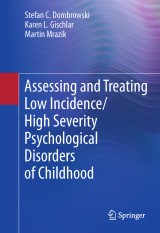Details

Assessing and Treating Low Incidence/High Severity Psychological Disorders of Childhood
|
CHF 130.00 |
|
| Verlag: | Springer |
| Format: | |
| Veröffentl.: | 08.07.2011 |
| ISBN/EAN: | 9781441999702 |
| Sprache: | englisch |
| Anzahl Seiten: | 254 |
Dieses eBook enthält ein Wasserzeichen.
Beschreibungen
<p>During the past several decades, interest in children’s psychological disorders has grown steadily within the research community, resulting in a burgeoning knowledge base. The majority of the attention and funding, not surprisingly, has focused on the more prevalent and well-known conditions. Although this raises the odds that young people with more well-known disorders such as ADHD, autism, and learning disorders will receive much-needed professional assessment and intervention, children with less frequently encountered disorders may experience a higher risk of misdiagnosis and inappropriate treatment. </p><p></p><p>Useful data has been scattered throughout the literature for severe-but-less-frequent childhood psychological disorders, including: fire setting; gender identity disorder; impulse control disorders (i.e., kleptomania, trichotillomania, intermittent explosive disorder); selective mutism; Munchausen by proxy; childhood schizophrenia; gang involvement; sexual offending; self-injurious behavior; and feral children. This concise volume offers up-to-date information on these conditions, which, though relatively rare, may have profound effect not only on the children themselves but also their families, friends, and the community at large. Coverag</p>e of each disorder is presented in an accessible format covering:<p></p><p></p><ul><li>Overview and history.</li><li>Description and diagnostic classification, with proposed changes to the DSM-V.</li><li>Etiology and theory.</li><li>Assessment tools and interview protocols.</li><li>Commonly used psychological and pharmacological treatment options.</li><li>Current research issues and directions for future investigation. </li></ul><p></p><p><i>Assessing and Treating Low Incidence/High Severity Psychological Disorders of Childhood</i><b> </b>is a must-have reference for researchers, clinicians, practitioners, and graduate students in clinical child and school psychology, pediatrics, psychiatry, social work, school counseling, education, and public policy.</p><p><br></p><p><br></p><div><br></div><p><br><br></p>
<p>Acknowledgments.- Introduction.- Juvenile Firesetters.- Gender Identity Disorder.- Munchausen by Proxy.- Feral Children.- The Youth Gang Member.- Impulse Control Disorders.- Selective Mutism.- Childhood Sexual Offenders.- Childhood Schizophrenia.- Self-Injurious Behavior.</p>
<p><b>Stefan C. Dombrowski</b>, Ph.D., is a Full Professor and Director of Training in the School Psychology Program at Rider University in Lawrenceville, New Jersey. He is also a licensed psychologist and certified school psychologist. Dr. Dombrowski completed his undergraduate studies at the College of William & Mary and his graduate work at the University of Georgia. He also completed a post doctoral fellowship in clinical child psychology at the University of California, Davis Medical Center. Dr. Dombrowski has published three books and more than three dozen articles in the area of child psychology including child maltreatment, child assessment, child psychopathology and prenatal exposures as they adversely impact children's psychological, behavioral, and educational functioning. </p><p><b>Karen L. Gischlar,</b> Ph.D., is an Assistant Professor in the School Psychology Program at Rider University in Lawrenceville, New Jersey. Dr. Gischlar has 19 years of experience in the public schools as a kindergarten teacher and school psychologist. She earned her Ph.D. in School Psychology from Lehigh University, where she served as a research scientist in the Center for Promoting Research to Practice. Dr. Gischlar's current research focuses on early intervention and prevention.</p><p><b>Martin Mrazik, </b>Ph.D., is an Assistant Professor in the Department of Educational Psychology at the University of Alberta in Edmonton, Alberta. Dr. Mrazik completed his undergraduate degre</p>es and M.Ed. at the University of Alberta, and his Ph.D. in Clinical Neuropsychology from the University of Georgia. He continues his clinical practice in Edmonton, Alberta where he has specializes in working with traumatic brain injuries and psychological disorders. Dr. Mrazik’s current research focuses on neurodevelopmental disabilities in children and sports concussions.<p></p>
<p>During the past several decades, interest in children’s psychological disorders has grown steadily within the research community, resulting in a burgeoning knowledge base. The majority of the attention and funding, not surprisingly, has focused on the more prevalent and well-known conditions. Although this raises the odds that young people with more well-known disorders such as ADHD, autism, and learning disorders will receive much-needed professional assessment and intervention, children with less frequently encountered disorders may experience a higher risk of misdiagnosis and inappropriate treatment. </p><p></p><p>Useful data has been scattered throughout the literature for severe-but-less-frequent childhood psychological disorders, including: fire setting; gender identity disorder; impulse control disorders (i.e., kleptomania, trichotillomania, intermittent explosive disorder); selective mutism; Munchausen by proxy; childhood schizophrenia; gang involvement; sexual offending; self-injurious behavior; and feral children. This concise volume offers up-to-date information on these conditions, which, though relatively rare, may have profound effect not only on the children themselves but also their families, friends, and the community at large. Coverage of each disorder is presented in an accessible format covering:</p><p></p><ul><li>Overview and history.</li><li>Description and diagnostic classification, with proposed changes to the DSM-V.</li><li>Etiology and theory.</li><li>Ass</li></ul><p></p>essment tools and interview protocols.<li>Commonly used psychological and pharmacological treatment options.</li><li>Current research issues and directions for future investigation. </li><p></p><p><i>Assessing and Treating Low Incidence/High Severity Psychological Disorders of Childhood</i><b> </b>is a must-have reference for researchers, clinicians, practitioners, and graduate students in clinical child and school psychology, pediatrics, psychiatry, social work, school counseling, education, and public policy.</p>
<p>Provides a single source compilation of topics that typically have been overlooked by broader textbooks on child psychopathology</p><p>Examines theory, research findings, and clinical aspects of lower incidence, but important conditions related to children’s mental health</p><p>Offers a consistent framework across chapters in contrast with edited books on the broader topic of child psychopathology</p>
















